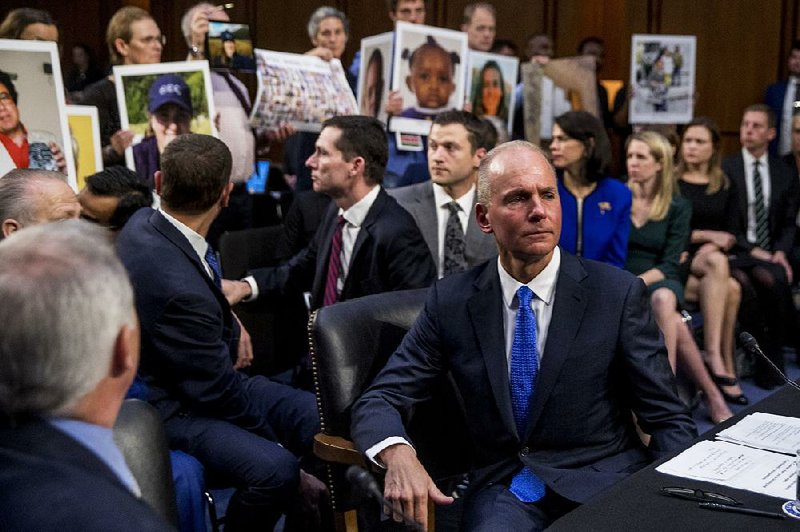WASHINGTON -- Boeing Chief Executive Officer Dennis Muilenburg faced intense grilling from the Senate Commerce Committee on Tuesday, in his first public questioning by Congress since a 737 Max crashed into the Java Sea exactly a year before.
Testifying about two deadly crashes involving the 737 Max -- including the Oct. 29, 2018, crash of Lion Air flight 610 -- Muilenburg told senators that he was open to reassessing how much responsibility his company takes on for guaranteeing that its new planes are safe. But he would not pledge his company's support for a stricter law.
"We have to get the balance right," Muilenburg said. "It's very important we have strong government oversight, strong [Federal Aviation Administration] oversight."
Lawmakers have said they are weighing changes to aviation safety laws in the wake of the crashes. Investigators have focused in particular on a legal setup that allows Boeing and other manufacturers to take on much of the work of certifying that aircraft are safe. A second day of hearings, this time before a House committee, is set for today.
[Video not showing up above? Click here to watch » https://www.youtube.com/watch?v=wDNe69jMHmU]
On Tuesday, Sen. Richard Blumenthal, D-Conn., said Boeing had misled his office after the crashes, blaming them on pilot error. In reality, Blumenthal said, "Those pilots never had a chance."
Blumenthal asked Muilenburg to commit to supporting efforts to change the safety certification system, but the CEO committed only to participating in such efforts. He denied that it was the company's position to blame the pilots.
"We are responsible for our airplanes," Muilenburg said.
Committee Chairman Roger Wicker, R-Miss., focused early criticism on both Boeing and the FAA. Wicker pointed to recently released correspondence between the manufacturer and regulator, saying it reflected "a disturbing level of casualness and flippancy" that seemed to corroborate criticisms of an "inappropriately close relationship" between Boeing and the FAA.
In one of the emails, Boeing's former chief 737 technical pilot, Mark Forkner, said he would be "jedi-mind tricking regulators into accepting the training that I got accepted by FAA etc.," a reference to the company's successful campaign to minimize training for pilots who would be flying the Max.
Pressed by Wicker on when Muilenburg learned of that email, the CEO said he had been informed of the details "just recently," as they were being reported publicly.
"I don't recall being briefed on the documents any time prior to that," Muilenburg said. "The comments, the values, the approaches that are described in those emails, are counter to our values."
Muilenburg said the company had made mistakes, and he expressed remorse. "As a husband and father, I am heartbroken by your losses," he told relatives of those killed in Indonesia and in Ethiopia under similar circumstances within five months. The family members, sitting three rows back from Muilenburg, at one point held up photographs of their lost husbands, wives and children.
Shortly after the Lion Air flight took off, the captain and first officer began to struggle with the controls, as a new automated feature on the Max received erroneous sensor data and repeatedly forced the nose down. The Indonesia crash killed 189 people.
Information about the feature -- the Maneuvering Characteristics Augmentation System -- had been kept out of the flight crew operating manual on Boeing's assumption that it would only rarely kick in.
"Delete MCAS," Forkner wrote to an FAA official in 2017 as the plane's five-year certification was nearing the finish line.
The deletion served Boeing's commercial interest at the time, which was to minimize the regulations it had to follow and the amount of costly training required of its customers.
Less than five months after the Indonesian crash, an Ethiopian Airlines flight went down in similar circumstances, killing 157 people.
Soon after that crash, regulators worldwide moved to ground the Max.
The crashes have presented a major crisis for Boeing. The grounding of the Max, a more fuel-efficient version of the popular 737, has hurt the company's finances and stock price and shaken public confidence.
Sen. Ted Cruz, R-Texas, told Muilenburg that his "quite dismaying."
Cruz tried to pin down Muilenburg on what he knew about [an instant message exchange that raised concerns] and when, how it was handled internally, and why it was not given to the senate committee or the FAA months ago.
"Mr. Muilenburg, how in the hell did nobody bring this to your attention in February?" Cruz asked, referring to the time period when Boeing provided it to the Justice Department. "How did you just read this a couple weeks ago?"
"I was made aware of the existence of this kind of document, this issue, as part of that discovery process in the investigation, early in the year, as you pointed out. At that point, I counted on my counsel to handle that appropriately," Muilenburg said.
Business on 10/30/2019
